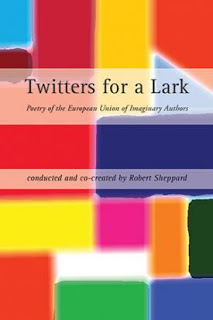[A hubpost for this sequence may be accessed here: Pages: Reflections on Fictional Poetry and Fictional Poets (1 and hubpost for the sequence) (robertsheppard.blogspot.com) Some of these posts have been incorporated into a prose chapter of my 2023 book, Doubly Stolen Fire, which you may read about, and purchase, here: Pages: Doubly Stolen Fire (a new book of hybrid texts) is now OUT (robertsheppard.blogspot.com)]
The third volume of the fictional poet project, as I am assembling it (see links below to other parts, and to the hubpost for this sequence, above) offers glimpses of writers, both hoaxing and hexing, and of impossible and improbable oeuvres. (Poppmeier appears in all three parts, indeed is the link between them, importantly. Here’s another link about her: Pages: Sophie Poppmeier says Don't Leave the EUOIA (robertsheppard.blogspot.com) )
In her perceptive essay, ‘European Fictions’, Zoë Skoulding describes A Translated Man and Twitters for a Lark as ‘the first two of [Sheppard’s] planned trilogy by fictional poets’. (Skoulding 2019: 176, in The Robert Sheppard Companion: see here: Pages: The launch of The Robert Sheppard Companion (set list)) This was news to me when I read it. It must have been something I said! In any case, it had been Zoë’s insistence that we develop one of René Van Valchenborch’s own fictional poets, Cyprus’s Gurkan Arnavut (for an ‘Enemies’ collaborative reading in March 2012) that had kickstarted the processes of conducting and composing the second book, so there is some justice in this. (All the poets of the EUOIA are listed (with videos) here: The Poets - European Union of Imaginary Authors (EUOIA) (weebly.com)) Here’s Zoe reading our collaboration at that event:
She warns, ‘The use of heteronyms is often a high-risk enterprise, breaking the conventions of authorial guarantee and shifting the habitual grounds of reading.’ (Skoulding 2019: 176) Indeed, announced on a poster (see below) as Van Valckenborch himself, I performed (uneasily) at the North Wales International Festival in 2013, see here: Pages: Reflections on A Translated Man (set list) (robertsheppard.blogspot.com) but not everyone was amused: ‘an audience member took exception to the perceived colonialism of a project that would invent poets of other languages’, and Skoulding notes that ‘heteronymic play does not replace the need to attend to perspectives that are offered by translation’, though in this third part of the trilogy, as I piece it together (and then take it apart for posting on this blog) I am largely bypassing the ethics of translation, but not ethics itself. (Skoulding 2019: 180) Skoulding, after a complex investigation of both books, concludes that their ‘poems ... are speculative, conjectural unsettlings of identity that resist damaging simplification. They imagine unknowable viewpoints and explore imagined frames of reference, but they also lay claim to a shared European vision that has shifted, since the first poems were written, towards something that can less easily be taken for granted’ after Brexit (a subject that is confronted in the translational poems of my other trilogy, ‘The English Strain’, in which I largely offer intralingual transpositions of traditional English sonnets). (Skoulding 2019: 188) (See here: Pages: Transpositions of Hartley Coleridge: the end of British Standards (and of The English Strain project) (robertsheppard.blogspot.com)
For Sophie Poppmeier’s lockdown journal, begin here: https://robertsheppard.blogspot.com/2021/10/a-fictional-poets-notebook-entry.html
A related piece begins here: Pages: One Off Episode: Transient Global Amnesia and the Fictional Poetry Project (EUOIA and all that) (robertsheppard.blogspot.com)
All these entries may be
thought of as the working notes towards the third book of my fictional poets
project, after A Translated Man and Twitters for a
Lark, which has its own website, EUOIA: European
Union of Imaginary Authors (EUOIA) - Home (weebly.com) ; this contains a page about
Poppmeier too: Sophie Poppmeier (1981-) Austria -
European Union of Imaginary Authors (EUOIA) (weebly.com) ) I have no idea whether this
will appear in print as a third book, but I'm working on that
assumption.















